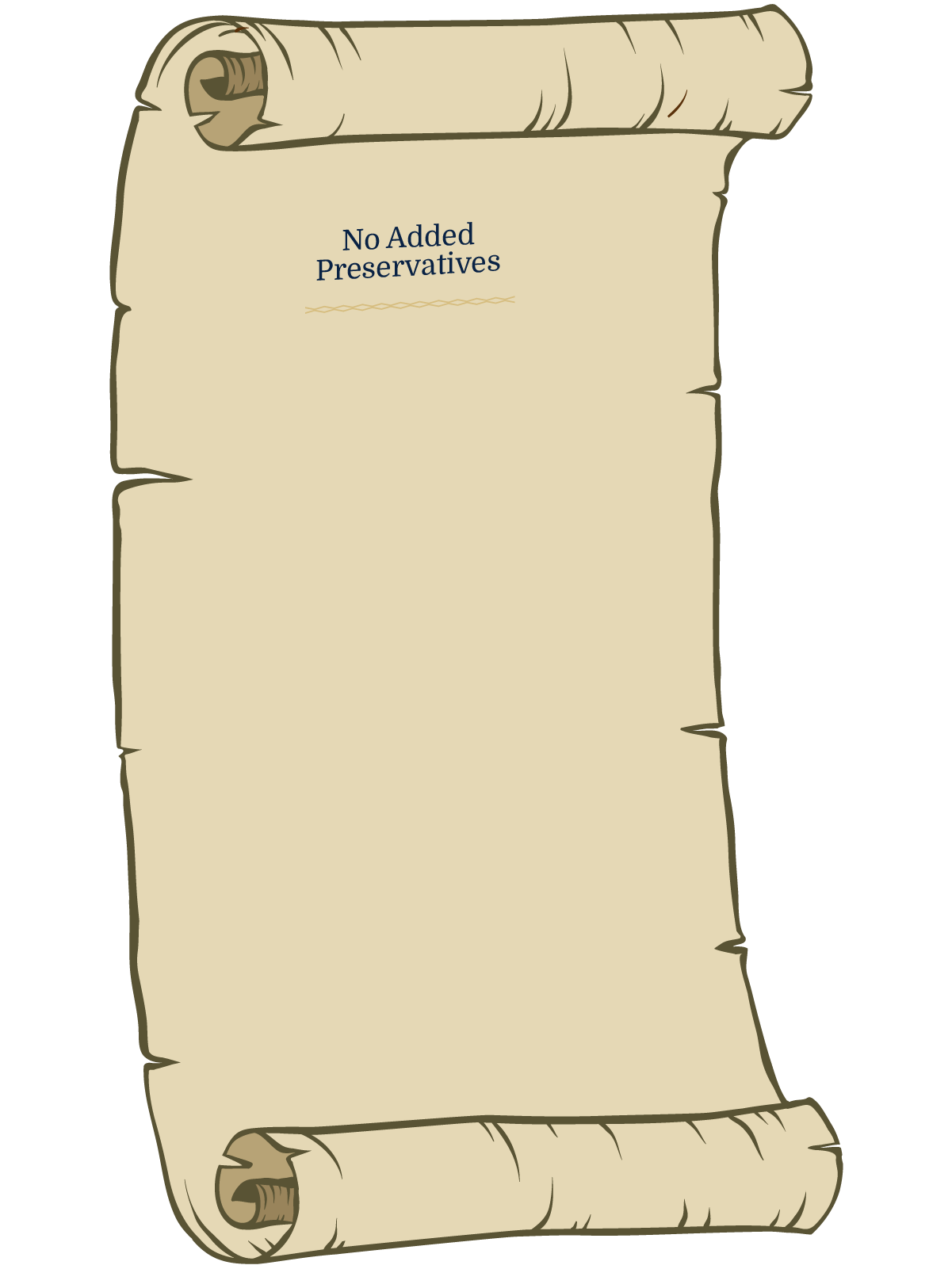
No Added Preservatives
Water feeds bacteria growth. By removing the water, we remove the need for strong preservatives.
Some of our products are even completely self-preserving. This makes them safe and gentle to use while having a longer shelf life.
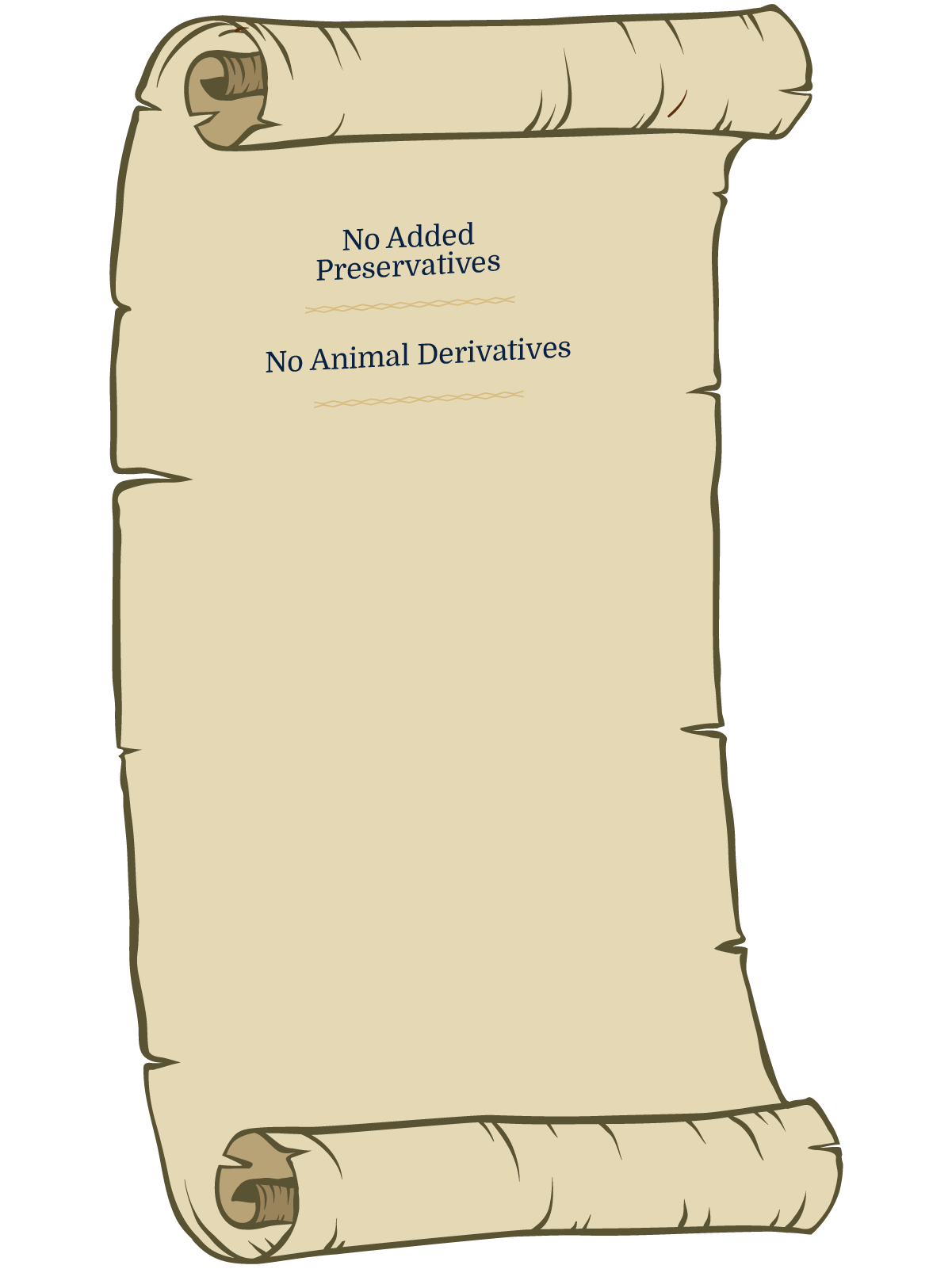
No Animal Derivatives
We now can extract the exact compounds that are most beneficial to our skin from plant-based sources.
Using animal derived ingredients when we have a host of plant-based alternatives that have the same, if not better, safety and efficacy just doesn't make sense to us.
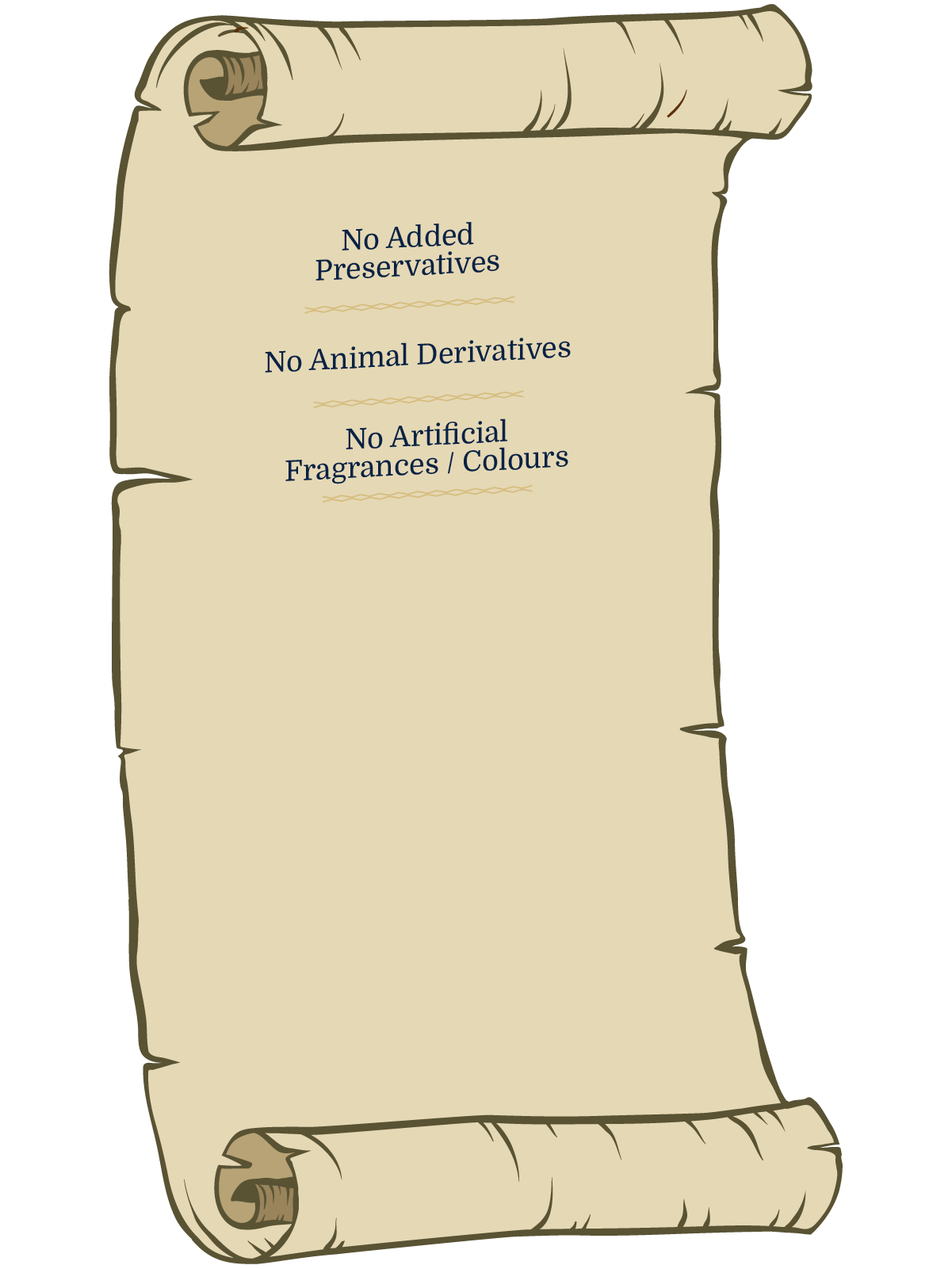
No Artificial Fragrances / Colours
Artificial fragrances and colors in skincare can cause skin irritation, hormone disruption, and environmental damage. These ingredients can also contain chemicals that are potentially toxic.
At Karmic, we opt for plant-based alternatives instead that are better for the environment and our customers.
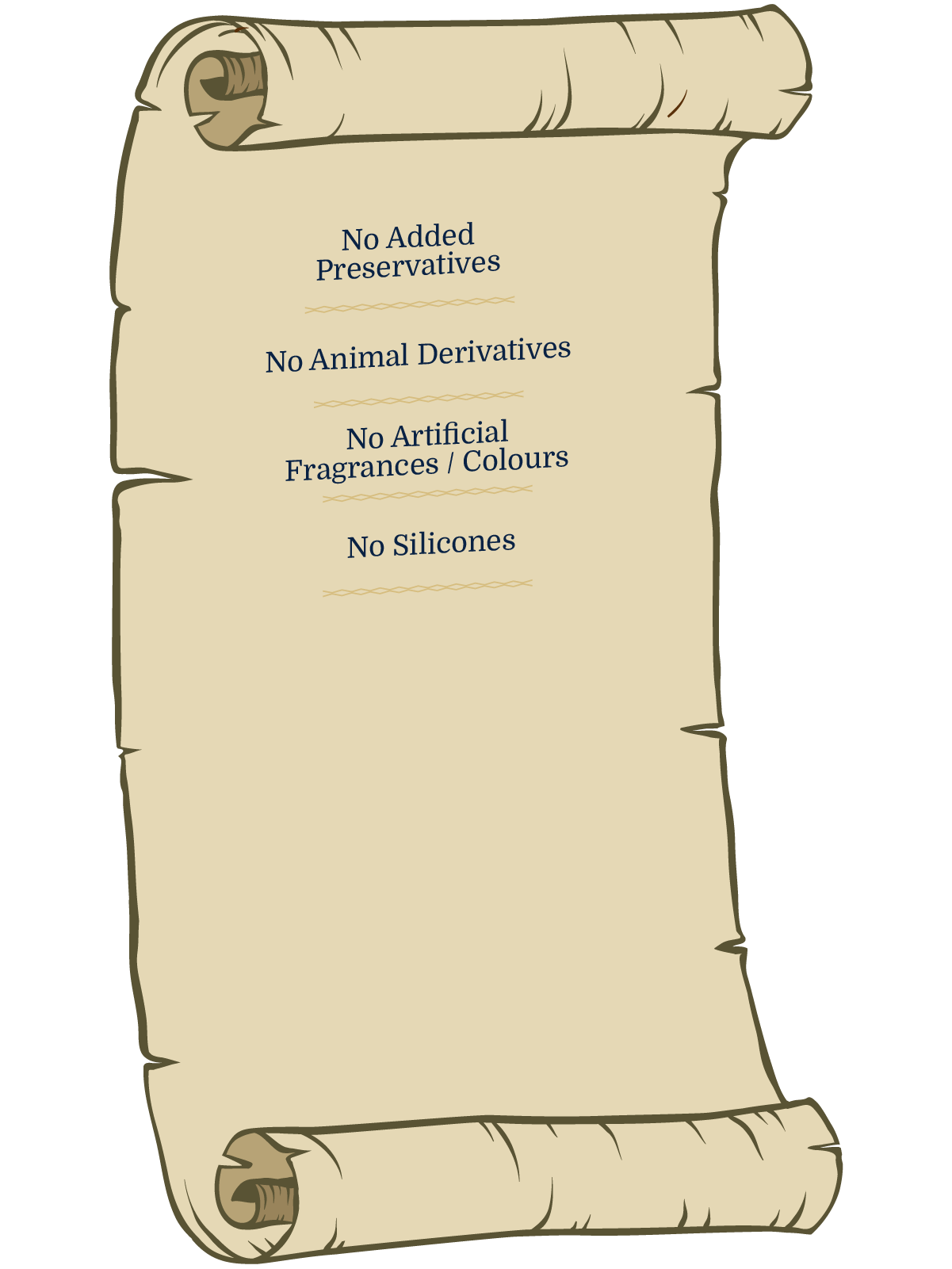
No Silicones
Silicones in skincare and haircare create a temporary illusion of smooth, hydrated skin or hair, but can clog pores, trap impurities and cause breakouts, irritation and dryness.
Silicones are hard to remove, create a barrier and prevent other skincare products from penetrating skin or hair, reducing effectiveness.
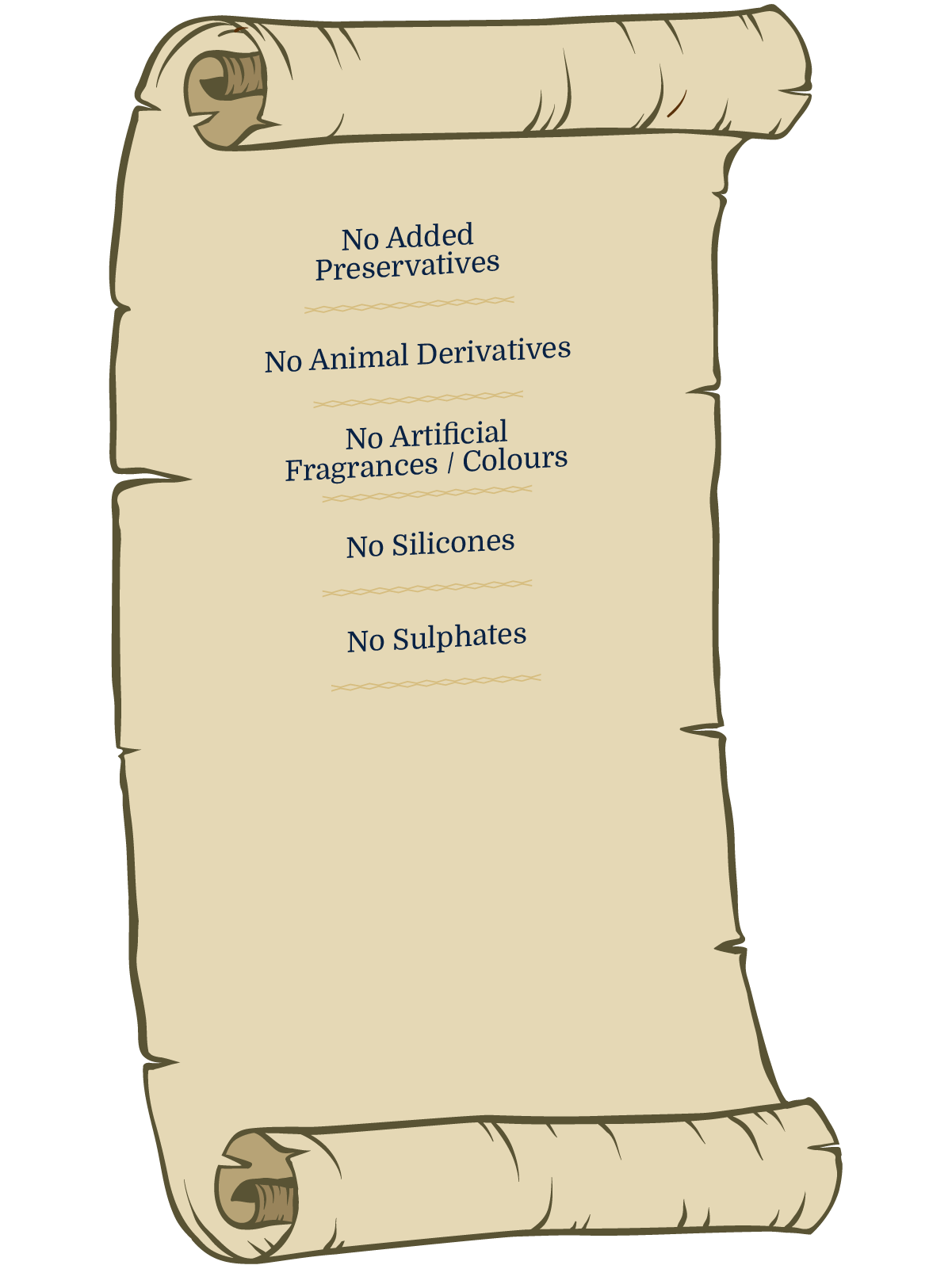
No Sulphates
Sulphates are a common skincare ingredient used for foaming. They can be harsh and strip skin of its natural oils, causing dryness, irritation and redness. Sulphates may also cause skin sensitivity and allergic reactions.
We avoid sulfates at Karmic and use gentler surfactants such as sodium lauroyl methyl and cocoyl isethionates instead. These are a mild, skin-friendly alternative.
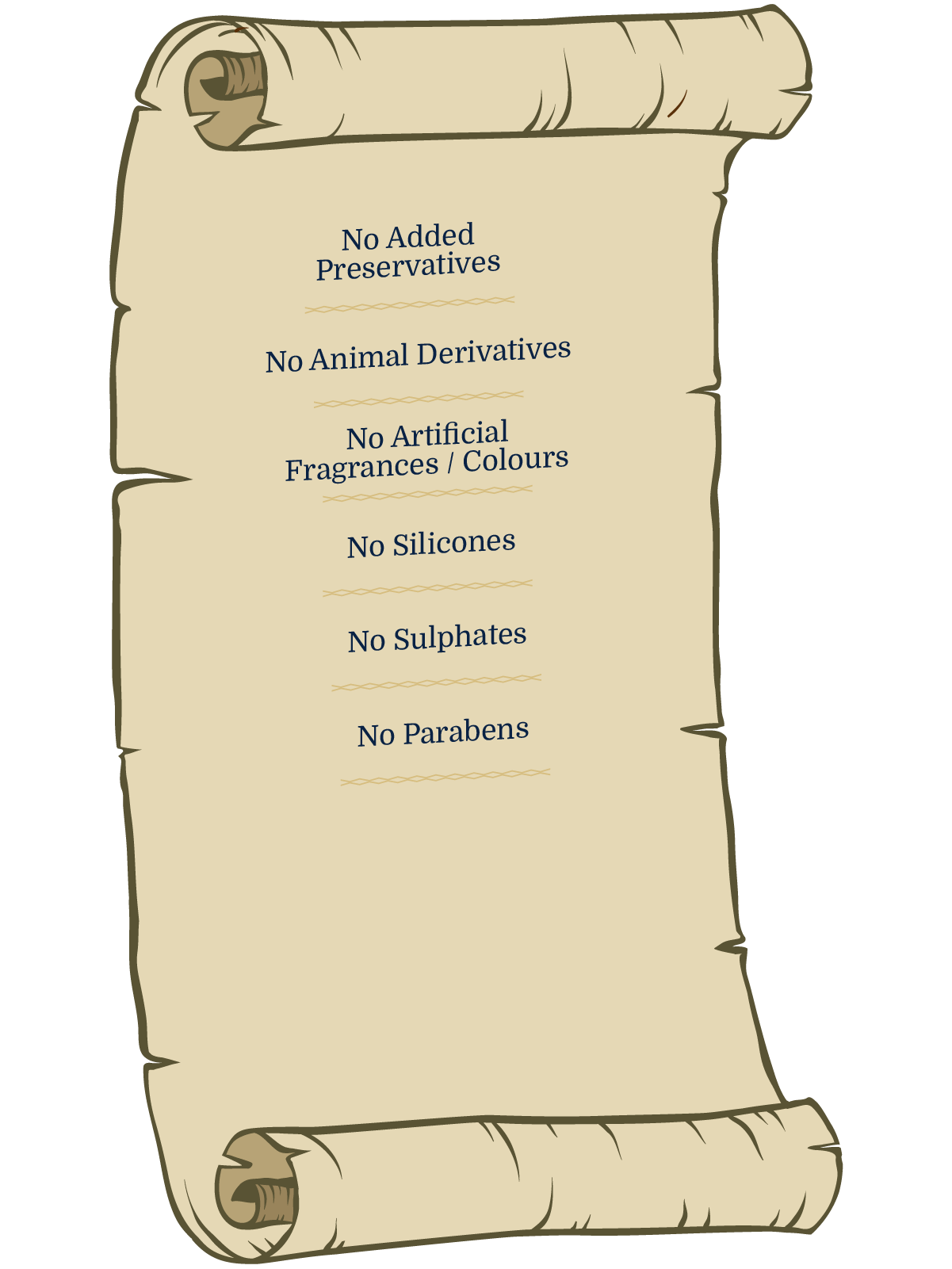
No Parabens
Parabens are commonly used in skincare to extend shelf life. However, studies suggest they can mimic estrogen, disrupt the endocrine system and lead to health issues such as increased risk of breast cancer and reproductive problems. Parabens can penetrate skin and accumulate in the body, causing potential long-term effects.
Despite scientific division on the exact dangers, we opt for paraben-free products which use alternative preservatives, such as Sorbitan Caprylate and Propanediol.
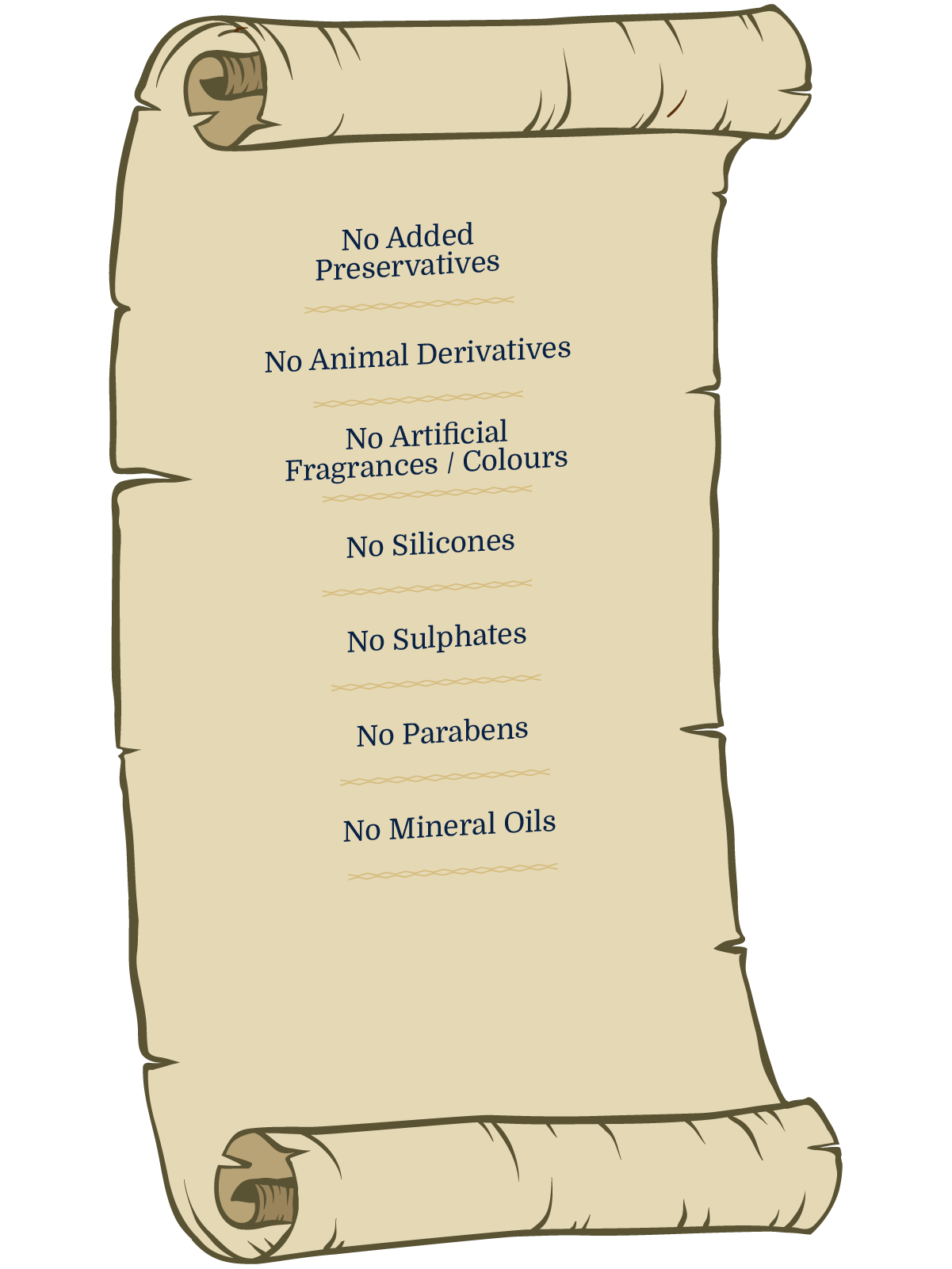
No Mineral Oils
While mineral oils are considered safe by some health agencies, they can contain impurities that may be harmful to health, particularly with long-term use.
They can prevent the skin from absorbing the essential nutrients and vitamins it needs to stay healthy.
Mineral oils are derived from non-renewable fossil fuels and their production can contribute to environmental degradation.
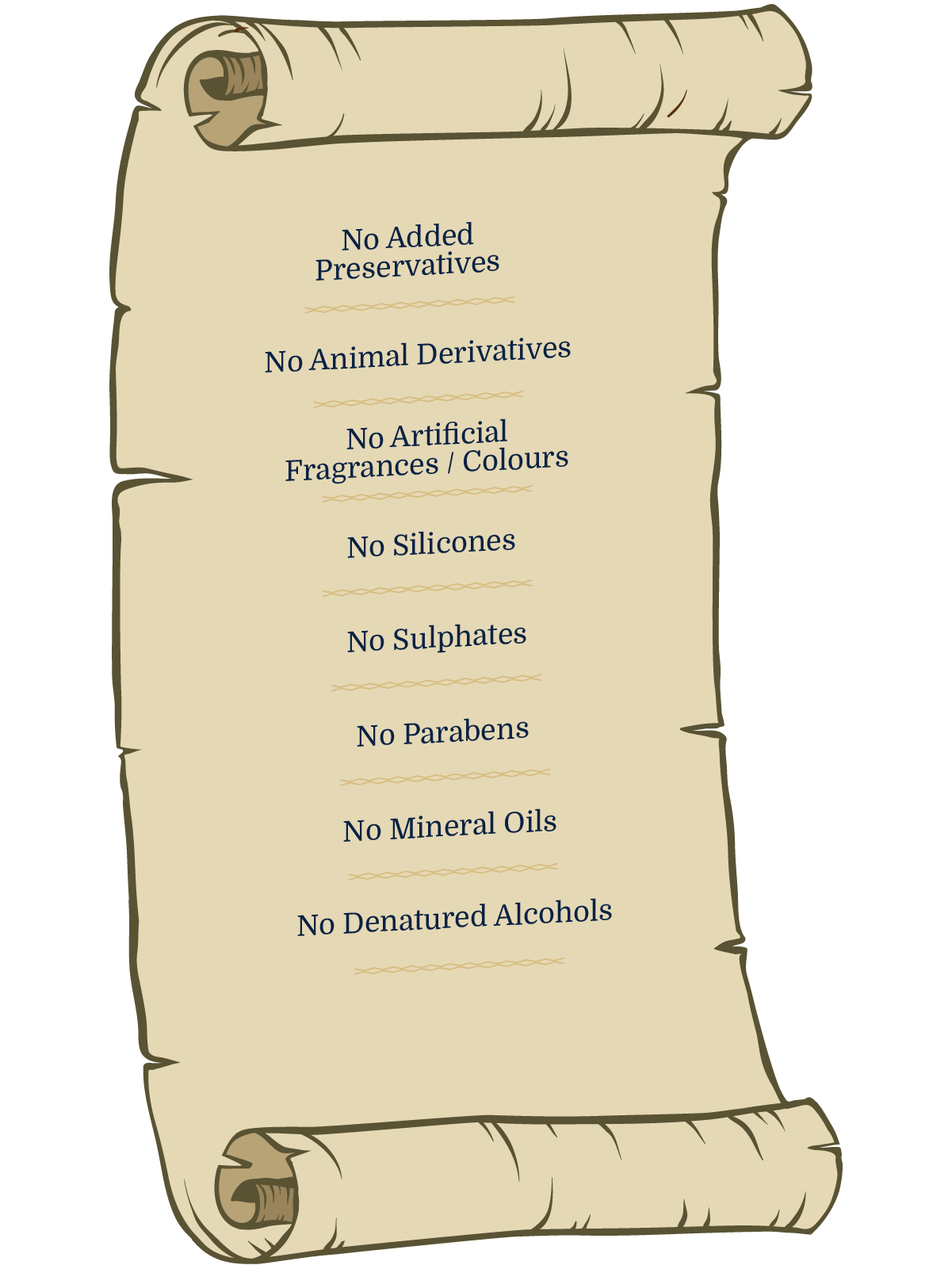
No Denatured Alcohols
Alcohols in skincare can be both positive & negative, depending on their type. Some, like cetyl & stearyl alcohol, can be moisturising (and are used at Karmic).
However, many skincare products contain denatured, ethanol, and isopropyl alcohol which strip the skin's natural oils, cause dryness, irritation and sensitivity. These harsh alcohols are what we avoid at Karmic.
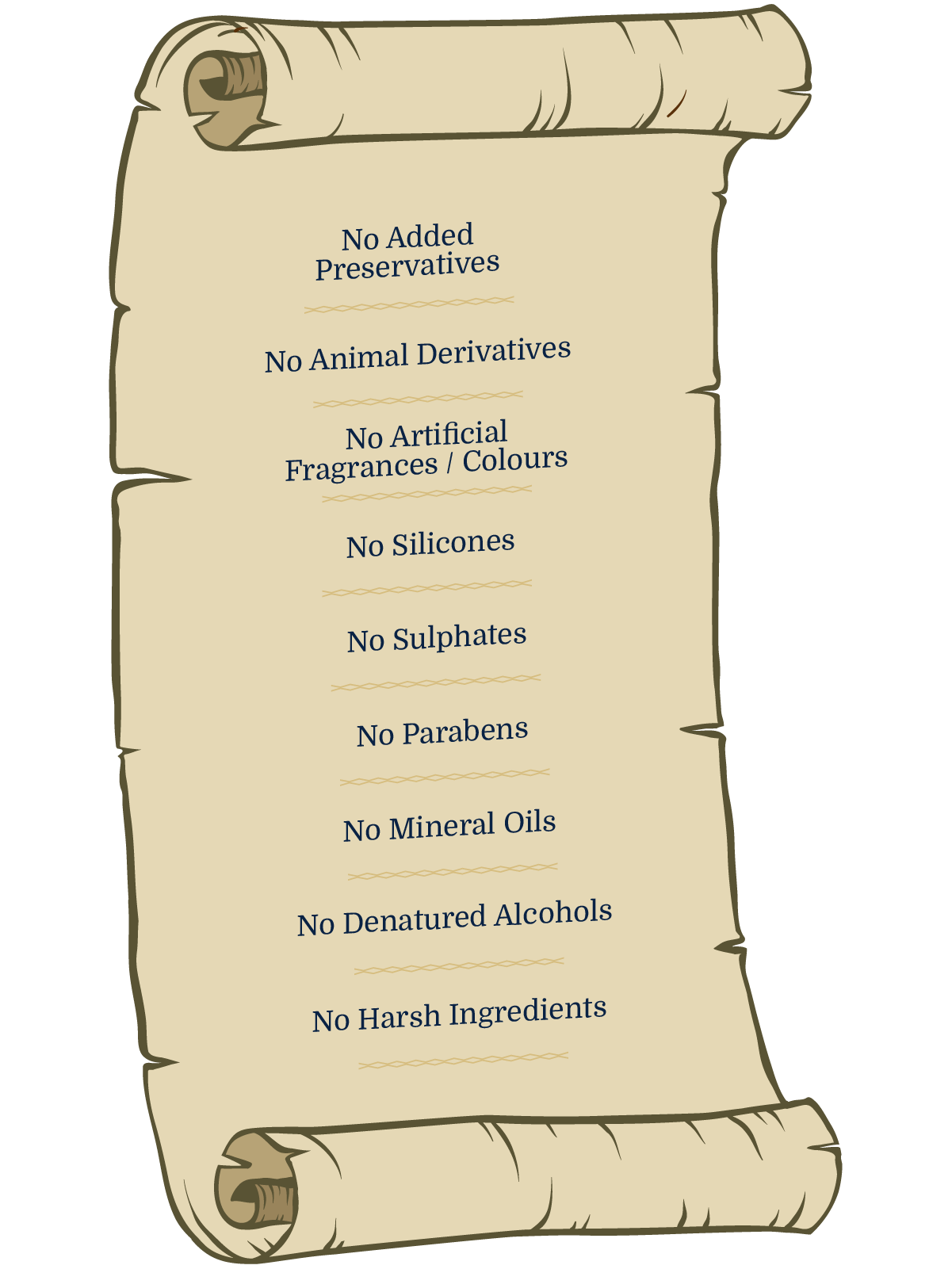
No Harsh Ingredients
Skincare manufacturers can use harsh chemicals to save money and extend product shelf life.
Consumers can reduce exposure by reading labels and choosing brands that use natural and organic ingredients.
Consumer demand for ethical and sustainable practices helps drive change in the industry.
No Added Preservatives
Water feeds bacteria growth. By removing the water, we remove the need for strong preservatives.
Some of our products are even completely self-preserving. This makes them safe and gentle to use while having a longer shelf life.
No Animal Derivatives
We now can extract the exact compounds that are most beneficial to our skin from plant-based sources.
Using animal derived ingredients when we have a host of plant-based alternatives that have the same, if not better, safety and efficacy just doesn't make sense to us.
No Artificial Fragrances / Colours
Artificial fragrances and colors in skincare can cause skin irritation, hormone disruption, and environmental damage. These ingredients can also contain chemicals that are potentially toxic.
At Karmic, we opt for plant-based alternatives instead that are better for the environment and our customers.
No Silicones
Silicones in skincare and haircare create a temporary illusion of smooth, hydrated skin or hair, but can clog pores, trap impurities and cause breakouts, irritation and dryness.
Silicones are hard to remove, create a barrier and prevent other skincare products from penetrating skin or hair, reducing effectiveness.
No Sulphates
Sulphates are a common skincare ingredient used for foaming. They can be harsh and strip skin of its natural oils, causing dryness, irritation and redness. Sulphates may also cause skin sensitivity and allergic reactions.
We avoid sulfates at Karmic and use gentler surfactants such as sodium lauroyl methyl and cocoyl isethionates instead. These are a mild, skin-friendly alternative.
No Parabens
Parabens are commonly used in skincare to extend shelf life. However, studies suggest they can mimic estrogen, disrupt the endocrine system and lead to health issues such as increased risk of breast cancer and reproductive problems. Parabens can penetrate skin and accumulate in the body, causing potential long-term effects.
Despite scientific division on the exact dangers, we opt for paraben-free products which use alternative preservatives, such as Sorbitan Caprylate and Propanediol.
No Mineral Oils
While mineral oils are considered safe by some health agencies, they can contain impurities that may be harmful to health, particularly with long-term use.
They can prevent the skin from absorbing the essential nutrients and vitamins it needs to stay healthy.
Mineral oils are derived from non-renewable fossil fuels and their production can contribute to environmental degradation.
No Denatured Alcohols
Alcohols in skincare can be both positive & negative, depending on their type. Some, like cetyl & stearyl alcohol, can be moisturising (and are used at Karmic).
However, many skincare products contain denatured, ethanol, and isopropyl alcohol which strip the skin's natural oils, cause dryness, irritation and sensitivity. These harsh alcohols are what we avoid at Karmic.
No Harsh Ingredients
Skincare manufacturers can use harsh chemicals to save money and extend product shelf life.
Consumers can reduce exposure by reading labels and choosing brands that use natural and organic ingredients.
Consumer demand for ethical and sustainable practices helps drive change in the industry.









Sal Butter
Benefit: Contains oleic acid, linoleic acid and stearic acid which soothe and nourish the skin.
Origin: Sal seed butter is obtained from the seeds of the Sal tree which are found in the Shivalik Hills of Harayana, east of the Yamuna
Fun Facts: The Sal tree has plenty of significance in Indian Culture, Hinduism, and Buddhism and is widely considered to be a “holy tree”. The 5th and 24th Buddhas preceding Gautama Buddha are said to have attained enlightenment under the Sal tree.
Ashwagandha
Benefit: Soothes stressed skin and contains collagen and natural oils to make skin supple and smooth
Origin: This plant thrives in the arid deserts of Rajasthan and Gujarat.
Fun Facts: Ashwagandha has been used in Ayurveda for thousands of years to treat a long list of health conditions including stress, insomnia, fever, and infertility. It’s known as an aphrodisiac. It is one of the most important ayurvedic herbs, with its earliest known mention in the Rig Veda, which was compiled around 6000 BC.
Amla
Benefit: Rich source of Vitamin C which helps brighten complexion, fade hyperpigmentation and protects the skin from the damaging effects of age and pollution
Origin: The Amla tree can be found growing wild in the forests of Uttar Pradesh
Fun Facts: According to Hindu mythology, once when Brahma was engrossed in the meditation of Vishnu, tears started rolling down his eyes. When these tears fell on the ground, the Amla tree germinated. Amla is known as a wonder herb for hair – the nutrients in it act as a natural conditioner, slows the greying process, strengthens hair follicles, and increases blood circulation in the scalp.
Brahmi
Benefit: Stimulates collagen production and soothes aggravated skin.
Origin: This herb is native to the wetlands of Southern India
Fun Facts: The entire plant can be used for different medicinal properties and is one of the oldest herbs in Ayurveda. It is considered to be a “herb of grace” as it is claimed that Brahmi can help achieve the highest goal of human life, self-realisation.
Neem
Benefit: Natural antibacterial which fights acne and controls oil production in the skin.
Origin: Neem is thought to have originated in Assam and Burma, where it is common throughout the central dry zone and the Siwalik hills.
Fun Facts: The Neem tree is one of the most popular trees in India. It is grown from the southern tip of Kerala to the Himalayan hills, in both tropical and subtropical regions. Its popularity is due to its drought-resistant properties and ability to thrive under the hottest conditions. Because of this, it is common to see neem trees used to shade the streets around temples, schools, public buildings, and most homes.
Manjishta
Benefit: Natural antioxidant, anti-inflammatory and antimicrobial and works to fights acne-causing bacteria.
Origin: Also known as Red Indian Madder, Manjishta can be found throughout the Himalayas at altitudes as high as 2800m.
Fun Facts: Ancient Indian sage and physician, Charaka, classified Manjishta as a “rejuvenative” that acts as a detoxifier. Sushruta, another Ayurvedic sage and surgeon, recommended it for balancing the bio-elements of the body for good health. Due to its bright red colour, Manjishta was originally used to dye cloth, but is now considered to be “the unsung hero” of Ayurveda.
Triphala
Benefit: A powerhouse combination of Amla, Bibhitaka and Haritaki that protects skin cells, helps rebuild skin protein and retain moisture in the skin.
Origin: The Amla tree can be found growing wild in the forests of Uttar Pradesh, while Bibhitaka is common on the plains and lower hills of South Asia. Haritaki is found in the Sub Himalayan region from Ravi eastwards to West Bengal and Assam.
Fun Facts: In the Charaka Samhita (one of two foundational Sanskrit texts on Ayurveda), Bibhitaki fruits are mentioned as having qualities to alleviate disease, bestow longevity, and intellectual prowess. The sages are thought to have regained youthfulness and attained a disease-free life of many hundred years.
Kokum
Benefit: Rich in fatty acids that nourishes and softens the skin
Origin: It is made from seeds of the kokum trees that are found in the Western Ghats of South India
Fun Facts: It is part of the mangosteen family. The skin of the fruit is usually sundried and used in cooking, as a souring agent alternative to tamarind. The fresh fruit is preserved with sugar to make a beverage called Kokum Sarbat, and the seeds are pressed to make kokum butter, which is used in the preparation of chocolate/confectionary, medicines, and cosmetics – making this a highly efficient fruit!
Saffron
Benefit: Contains active compounds that work against inflammation, hyperpigmentation, and UV radiation.
Origin: Grown in the cool hills of the Kashmir Valley, specifically within the Pampore area of Jammu and Kashmir
Fun Facts: Saffron is the most expensive spice in the world and is worth more than its weight in gold. This is because the flowers must be handpicked and there are just three stigmas per flower.
Nagarmotha
Benefit: Natural anti-inflammatory and astringent properties help reduce redness and irritation
Origin: Native to the riverbeds of Madhya Pradesh
Fun Facts: The antibacterial properties of Nagamotha may have helped prevent tooth decay in people who lived in Sudan 2000 years ago.
Turmeric
Benefit: Contains antioxidants and anti-inflammatory components, which can provide glow to the skin, while helping to heal wounds by decreasing inflammation and oxidation.
Origin: There are around 30 varieties of turmeric that are grown across India.
Fun Facts: India produces almost the entire world’s crop of turmeric and consumes 80% of it. Turmeric began to emerge as an important medicine in Ayurveda around 500BC, and today is a staple in every Indian household as it has multiple uses in cuisine, medicine, and dyes.
Karanja
Benefit: Naturally anti-inflammatory, acts as an astringent
Origin: Pressed from the seeds of the Pongam tree, found in the Himalayan foothills
Fun Facts: Karanja seed oil has a history of being extremely versatile - traditionally it has been used in lamp oil, leather tanning, and soapmaking; today it can be used as a natural insect repellent (owing to its bitter taste), a biofuel, and is thought to be a natural UV filter that protects the skin against sun damage.
Aloe Vera
Benefit: Encourages hyaluronic acid production, which increases the moisture in the skin cells, while natural anti-inflammatory properties soothe the skin
Origin: The aloe plant is native to North Africa but is now cultivated in many regions in India including Satanapalli in Andhra Pradesh and Rajpipla in Gujarat.
Fun Facts: The Deori Village in Jharkhand is now known as “Aloe Vera Village”. Aloe vera can be seen flourishing in every field and courtyard of the village. The villagers were trained by a local Agricultural University for free on producing the plant. As the plant grows in hot climates, requires little attention, and starts growing in around 18 months, the villagers were able to reap the benefits of aloe planting quickly. Most of the aloe vera is cultivated by the women of the village, allowing them to become financially independent. Through aloe cultivation, the village’s average monthly income has doubled as compared to paddy cultivation.
Holy Basil (Tulsi)
Benefit: Tulsi has antibacterial properties which fight acne. It supports healthy skin aging and soothes skin conditions like eczema. It is also beneficial in hair care as it prevents hair loss by stimulating the scalp, and contains antifungal properties which work to reduce dandruff.
Origin: Tulsi is widely grown in the Gir Wildlife Sanctuary and Sassangir National Park in Gujarat, India.
Fun Facts: It is one of the most sacred plants in India and is considered the “Queen of Herbs” for its restorative and spiritual properties. As it travelled west along early trade routes from the Orient to Europe, it became known to the Christians as “holy” or “sacred”.
Mango
Benefit: Mango seed butter is full of fatty acids and is an effective moisturiser that helps soften the skin. The abundance of Vitamin E and Vitamin C can help protect the skin from environmental stressors such as sunlight and pollution.
Origin: Mango seed butter comes from pressing mango seeds. There are hundreds of varieties of mangoes which are grown across different Mango hotspots around the country. The land of Nawabs is famous for its royal mangoes. Lucknow and its adjoining towns are known for its “mango belt” in North India.
Fun Facts: India’s obsession with mangoes is on par with Bollywood and cricket. Every March, the first batches of mango for the season make front-page news. India is the largest producer and consumer of mangoes, producing 40% of the world’s total supply but only accounting for 1% of global mango trade.
Ginger
Benefit: Ginger contains natural oils known as gingerols that reduce inflammation and pain and can help soothe irritated skin. The antioxidant properties in ginger can help reduce the appearance of scars
Origin: Since you can grow ginger practically anywhere, it is cultivated in most states in India. However, Karnataka, Orissa, Assam are known to be top ginger producing states.
Fun Facts: Ginger is known as “the universal medicine” and is so widely used in Ayurveda that it is an entire medicine chest in itself. There is an ayurvedic sutra (verse) that says everyone should eat fresh ginger before lunch and ginger to enhance digestion and transportation of nutrients.
Nigella
Benefit: Rich in highly moisturising plant acids which maintains the skin’s lipid barrier. Natural antihistamine and anti-microbial properties work to soothe the skin.
Origin: Thought to have originated in Southeast Asia, Nigella seed oil has been used in Northern Africa for thousands of years to treat multiple ailments. In India, it is mainly cultivated in West Bengal, Punjab, Jharkhand, Himachal Pradesh, Bihar, and Assam.
Sweet Almond
Benefit: Contains Vitamins A and E, Omega-3 fatty acids and Zinc to improve complexion and reverse sun damage.
Origin: Sweet almond oil is obtained from pressing almond nuts. The Indian almonds grow throughout the warmer regions of India, including Maharashtra, Karnataka, Tamil Nadu, Andhra Pradesh, and Kerala.
Fun Facts: The almond tree is native to India, the Middle East, and North Africa and is agreed to be one of the earliest cultivated foods and is mentioned as far back in history as the Bible.
Apricot
Benefit: Contains Vitamin C and Vitamin E which helps improve skin tone, maintain softness, radiance, and clarity of the skin. Also contains Oleic acid which strengthens the skin’s barrier function.
Origin: Apricot trees grow wild in the hills of Shimla and Himachal Pradesh.
Fun Facts: Apricots are a member of the rose family and are also a relative of the peach.
Licorice
Benefit: Contains glabridin, which helps stop discoloration immediately after sun exposure. Also helps to regenerate collagen and elastin supply to keep the skin smooth and supple.
Origin: It is grown in the sub-tropical regions in North-West India, specifically in Punjab and the Himalayan regions.
Fun Facts: Licorice has been used for medicinal purposes worldwide and has been revered by the ancient Egyptians, Greeks, Romans, Chinese and Hindus. Licorice can be used to treat sore throats and ulcers and even help to promote adrenal gland function.
Seabuckthorn
Benefit: The fruit contains all four types of omega fatty acids, Vitamins C and E, and antioxidants which protect the skin against external stressors which lead to signs of ageing.
Origin: Found in generally dry areas such as the cold deserts of Ladakh and Spiti in the Himalayan region.
Fun Facts: Also referred to as “The Holy Fruit of the Himalayas”, the fruit has been used for centuries in traditional medicine and eaten as part of a healthy diet. Sea buckthorn contains 10 times more Vitamin C than an orange.
Grape
Benefit: Contains beta-carotene and Vitamins D, C, E that protects against free radicals and assists in the production of collagen.
Origin: This oil is derived from the seeds of grapes and is a by-product of winemaking. Although its origins come from the winemaking regions of France, Italy, and Switzerland, today, states including Maharashtra, Karnataka, and Telangana are considered major grape-growing states.
Zinc Oxide
Benefit: Zinc Oxide is considered one of the best sunscreen ingredients we have access to. It is the primary component in mineral (or “physical”) sunscreens. It blocks both UVA and UVB rays which are responsible for causing burns, skin damage, and skin cancer. It is also water resistant and photostable (meaning it won’t break down when exposed to sun).
Fun Facts: Although sunscreen itself isn’t that old, there are historical reports from as far back as 500BC tying Zinc Oxide to medicinal use. Ancient Greek doctors may have created ointments out of zinc oxide to treat skin cancers.



